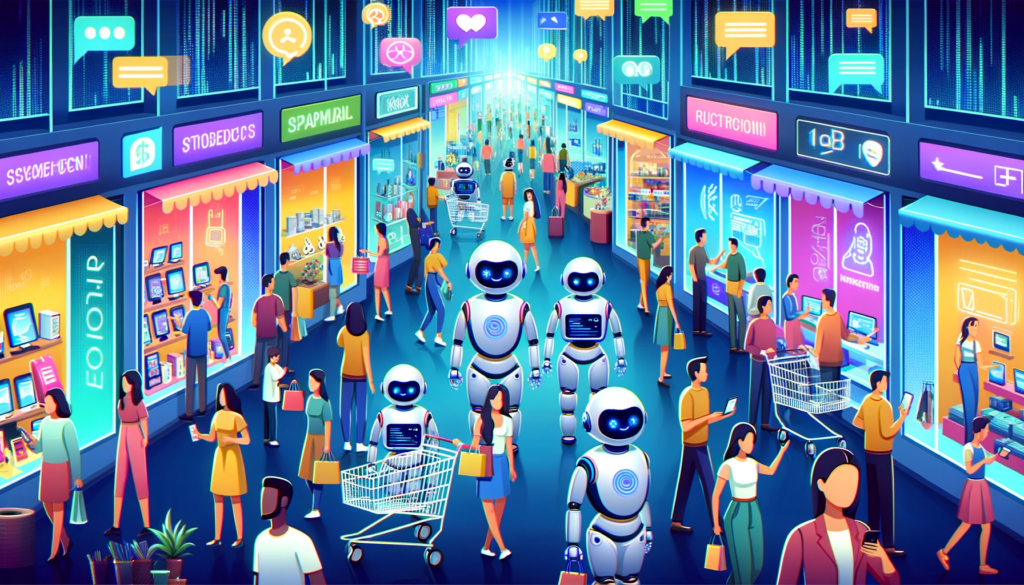2024 is almost here, and what an amazing year 2023 has been.
The world of tech and development has probably never shifted faster. And unless you’ve been living under a rock, you would have heard the AI shenanigans on the internet.
Since the launch of GPT 3.5 in 2023, hundreds of Git repositories have been launched, and there are countless AI driven platforms that make life easier for many.
Fortunately, the AI wave has also started changing the eCommerce space for the better.
This blog takes you through the different ways AI eCommerce has and will continue to affect the field, and what is in it for you as a business.
Excited? Let’s dive in.
1. More Credibility with Advanced Analytics
In eCommerce, trust is everything, and AI is playing a pivotal role in building it. For instance, Amazon leverages AI to tailor product recommendations, analyzing customers’ past purchases and browsing habits. This personal touch not only impresses customers but also earns their trust.
Consider Zara’s approach as well. They use AI for dynamic pricing, adapting prices in real-time to reflect market trends. This transparency in pricing not only appeals to customers’ sense of fairness but also cements their trust in the brand.
Here’s an interesting fact: a Salesforce report reveals that 76% of customers expect consistent interactions across departments. AI steps in by unifying customer data, ensuring each interaction is informed and personal, which is crucial in maintaining customer trust.
App development companies in Malaysia are also beginning to notice this and are tailoring apps that focus on boosting credibility.
2. Tailored Shopping Experiences
Sophisticated AI algorithms are quietly revolutionizing how we shop online. It’s a world where technology anticipates your desires before you even articulate them.
Behind every recommendation and personalized page, there’s a complex web of machine-learning algorithms at play. These algorithms sift through mountains of data — your past purchases, items you’ve browsed, and even how long you linger on certain products. It’s akin to a detective piecing together clues to solve a mystery, where the mystery is your unique taste and preferences.
Key Insights:
- Machine learning algorithms analyze behavioral data to offer bespoke shopping experiences.
- AI-driven predictive analytics forecast future buying trends, guiding shoppers toward their next favorite purchase.
- The seamless integration of AI in user interfaces makes personalization feel intuitive, not intrusive.
3. See what you like with Contextual Targeting
Contextual targeting in eCommerce, driven by AI, reshapes how products align with customer interests in real-time. When a user reads a travel blog, AI in ecommerce models can smartly showcase travel accessories or destination guides, tapping into their immediate interest. This approach transcends basic demographic targeting, focusing on what the customer is engaged with at that moment. In fact, research says 79% of consumers are more comfortable seeing contextual than behavioral ads.
AI’s role in this is crucial for its precision and subtlety. It analyzes the content being viewed to predict and suggest relevant products, creating a more natural and integrated shopping experience. This method ensures that marketing feels less intrusive and more like a seamless part of the customer’s online exploration.

4. Enter the Chatbot Era
Chatbots are increasingly becoming a familiar feature in AI ecommerce. In 2022, around 88% of customers interacted with a chatbot. The majority found these interactions to be positive, indicating a growing comfort with this technology.
The chatbot market is showing significant growth. In 2023, it’s projected to reach over $994 million. Small businesses find chatbots particularly appealing for their cost-effectiveness and ability to efficiently handle customer inquiries.
In the AI driven eCommerce sector, the impact of chatbots is notable. Transactions facilitated by chatbots are expected to hit $112 billion by 2023. This growth is a testament to their role in enhancing the shopping experience and streamlining sales processes.
Looking to the future, chatbots are set to play an even more crucial role in customer service.
5. Predictive analysis in AI eCommerce
Predictive analysis in AI eCommerce platforms guides customers smoothly through their shopping journey, ensuring a tailored and enjoyable experience.
In the awareness stage, AI highlights relevant products and services, grabbing potential customers’ attention with customized messages.
During consideration, AI suggests products matching customer interests, simplifying their decision-making process.
This approach involves deep analysis of buying patterns and demographics, ensuring offers and messages resonate perfectly with the audience.
At the decision stage, AI in ecommerce presents personalized suggestions, encouraging customers toward products they’ll likely adore.
6. Cross-selling and upselling with AI driven algorithms
AI-driven algorithms are reshaping how businesses approach discounts, offers, and promotions. They’re adept at tailoring these strategies to align perfectly with customer preferences.
AI functions like a savvy analyst, sifting through shopping patterns to recommend just the right complementary products. This isn’t about making guesses; it’s about understanding customer needs precisely.
The strength of AI lies in its ability to personalize. It digs into vast data sets to uncover individual preferences, using insights from purchase history and demographics to create targeted upselling strategies.
This method goes beyond boosting sales to enrich the shopping experience. Customers enjoy offers and suggestions that are not only relevant but also add value to their unique shopping journey.

7. Your wall of defense against online shopping frauds
Online shopping’s got its share of headaches, like chargeback, ATO, triangulation, and interception frauds. These are the kinds of tricks fraudsters use to mess with eCommerce sites. But here’s where AI steps in, especially in tech-savvy fields like app development in Malaysia.
It’s constantly on the lookout for these frauds. The cool part? AI models don’t just look at what’s obvious; they are programmed to spot the hidden patterns that might slip by most people. It’s all about connecting the dots and catching those sneaky fraud attempts.
What’s really impressive is how AI’s machine learning algorithms keep evolving. They’re getting better and better at building solid fraud detection systems. These systems are comprehensive, meaning they look at the whole picture to flag anything suspicious.
8. Recognize Pain Points with AI
AI begins by collecting comprehensive data, covering everything from sales to customer feedback. It then analyzes patterns, identifying anomalies and trends that signal underlying issues, such as sales fluctuations or supply chain disruptions.
Using predictive analytics, AI for ecommerce forecasts future challenges, aiding in preemptive action against potential operational or financial issues.
With these insights, businesses can strategically address pain points. This might involve optimizing inventory management, enhancing customer service, or refining marketing strategies.
The result is a more efficient, responsive operation. Businesses can anticipate and mitigate challenges, leading to improved customer satisfaction, reduced costs, and enhanced overall performance.
Wrapping up
So, we’ve seen how AI is really changing the game in online shopping. It’s almost like having a super-smart buddy who knows exactly what your customers want, keeps your store safe, and even helps you figure out any tricky spots in your business.
At Segwitz, we get how important this is. We’re always running experiments with AI to make your eCommerce business smarter and your customers happier. Think of us as your go-to tech strategy partners who make sure you’re always ahead of the curve.
Want to make your online store the best it can be with AI? Give us a shout at Segwitz. We’re here to help you nail it in the eCommerce world, making things smoother for you and your customers.
And hey, if you’re looking for more content on everything in and out about tech and development, you don’t wanna miss our blog.





 Booking System
Booking System eCommerce
eCommerce On-Demand Services
On-Demand Services Community App
Community App Ordering App
Ordering App Loyalty App
Loyalty App Online Learning
Online Learning Directory
Directory Marketplace
Marketplace SaaS
SaaS P2P Platform
P2P Platform eHailing
eHailing Healthcare
Healthcare Finance
Finance Logistics
Logistics Education
Education Food & Beverage
Food & Beverage Retail
Retail FMCG
FMCG Sports
Sports Travelling
Travelling Manufacturing
Manufacturing Renewable Energy
Renewable Energy Mobile Application Development
Mobile Application Development Web Application Development
Web Application Development Source Code Review
Source Code Review Internet of Things (IoT)
Internet of Things (IoT) Cyber Security
Cyber Security SegWitz SandBox – Dev-Team as Subscription
SegWitz SandBox – Dev-Team as Subscription SegWitz Streamline – SOP Systemization
SegWitz Streamline – SOP Systemization SegWitz ScaleUp – Tech Transformation of SME & PLC
SegWitz ScaleUp – Tech Transformation of SME & PLC SegWitz StartUp – MVP & Scaling
SegWitz StartUp – MVP & Scaling